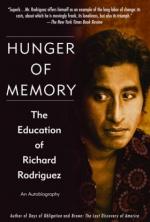
|
| Name: _________________________ | Period: ___________________ |
This test consists of 5 multiple choice questions, 5 short answer questions, and 10 short essay questions.
Multiple Choice Questions
1. In Complexion, Chapter 3, what does Rodriguez realize about education?
(a) It changes how people look at the world.
(b) It gives people a voice.
(c) It provides better job options.
(d) It is a waste of time.
2. When a student complains that he is being kept out of law school, what does Rodriguez do?
(a) Stay out of it.
(b) Argue against his case.
(c) Support his case.
(d) Tell him to stop whining.
3. Where did Rodriguez teach in the 1960s and 1970s?
(a) Harvard.
(b) Stanford.
(c) UCLA.
(d) UC Berkeley.
4. Why does Rodriguez's mother call him "Mr. Secrets"?
(a) Because he likes to surprise them.
(b) Because he lies to his family.
(c) Because he hides things from his family.
(d) Because he does not talk to his family.
5. Based on his conversation with his classmate, what does Rodriguez decide?
(a) To take the worst job that was offered to him.
(b) Not to take any of the teaching jobs.
(c) To only take a job if he knows he did not get it through affirmative action.
(d) To take the best job that was offered to him.
Short Answer Questions
1. How does Rodriguez feel about writing a book on his family?
2. In Mr. Secrets, Chapter 1, what does Rodriguez's mother beg him not to do?
3. What does Rodriguez have to face in order to write the book?
4. What does Rodriguez tell his mother about talking to strangers?
5. In Complexion, Chapter 3, what new hobby does Rodriguez take up?
Short Essay Questions
1. How do people respond to Rodriguez's skin color when he is younger?
2. What does Rodriguez's mother tell him about writing about their family? What does his editor tell him?
3. What does Rodriguez think about the Civil Rights Movement?
4. How does Rodriguez handle applying for teaching positions?
5. How does Rodriguez feel about writing? How does he feel about writing about his family? How has he handled it in the past? How is he handling it now?
6. How do Rodriguez's ideas about religion change as he grows up? How does his practice of religion change?
7. What conversation does Rodriguez have with a colleague about teaching positions? What decision does Rodriguez make as a result of that conversation?
8. As more minority students attend college, what does Rodriguez notice about their relationship to their culture? Give specific examples.
9. As a child, what does Rodriguez learn about dark skin?
10. What are Rodriguez's parents' ideas about masculine and feminine characteristics? How does that affect Rodriguez?
|
This section contains 912 words (approx. 4 pages at 300 words per page) |

|




